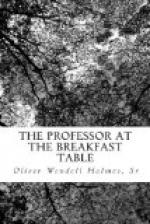I do not say that your heart will beat as mine did, I am willing to confess, when I entered the dim chamber. Did I not tell you that I was sensitive and imaginative, and that I had lain awake with thinking what were the strange movements and sounds which I heard late at night in my little neighbor’s apartment? It had come to that pass that I was truly unable to separate what I had really heard from what I had dreamed in those nightmares to which I have been subject, as before mentioned. So, when I walked into the room, and Bridget, turning back, closed the door and left me alone with its tenant, I do believe you could have grated a nutmeg on my skin, such a “goose-flesh” shiver ran over it. It was not fear, but what I call nervousness,—unreasoning, but irresistible; as when, for instance, one looking at the sun going down says, “I will count fifty before it disappears”; and as he goes on and it becomes doubtful whether he will reach the number, he gets strangely flurried, and his imagination pictures life and death and heaven and hell as the issues depending on the completion or non-completion of the fifty he is counting. Extreme curiosity will excite some people as much as fear, or what resembles fear, acts on some other less impressible natures.
I may find myself in the midst of strange facts in this little conjurer’s room. Or, again, there may be nothing in this poor invalid’s chamber but some old furniture, such as they say came over in the Mayflower. All this is just what I mean to, find out while I am looking at the Little Gentleman, who has suddenly become my patient. The simplest things turn out to be unfathomable mysteries; the most mysterious appearances prove to be the most commonplace objects in disguise.
I wonder whether the boys who live in Roxbury and Dorchester are ever moved to tears or filled with silent awe as they look upon the rocks and fragments of “puddingstone” abounding in those localities. I have my suspicions that those boys “heave a stone” or “fire a brickbat,” composed of the conglomerate just mentioned, without any more tearful or philosophical contemplations than boys of less favored regions expend on the same performance. Yet a lump of puddingstone is a thing to look at, to think about, to study over, to dream upon, to go crazy with, to beat one’s brains out against. Look at that pebble in it. From what cliff was it broken? On what beach rolled by the waves of what ocean? How and when imbedded in soft ooze, which itself became stone, and by-and-by was lifted into bald summits and steep cliffs, such as you may see on Meetinghouse-Hill any day—yes, and mark the scratches on their faces left when the boulder-carrying glaciers planed the surface of the continent with such rough tools that the storms have not worn the marks out of it with all the polishing of ever so many thousand years?




